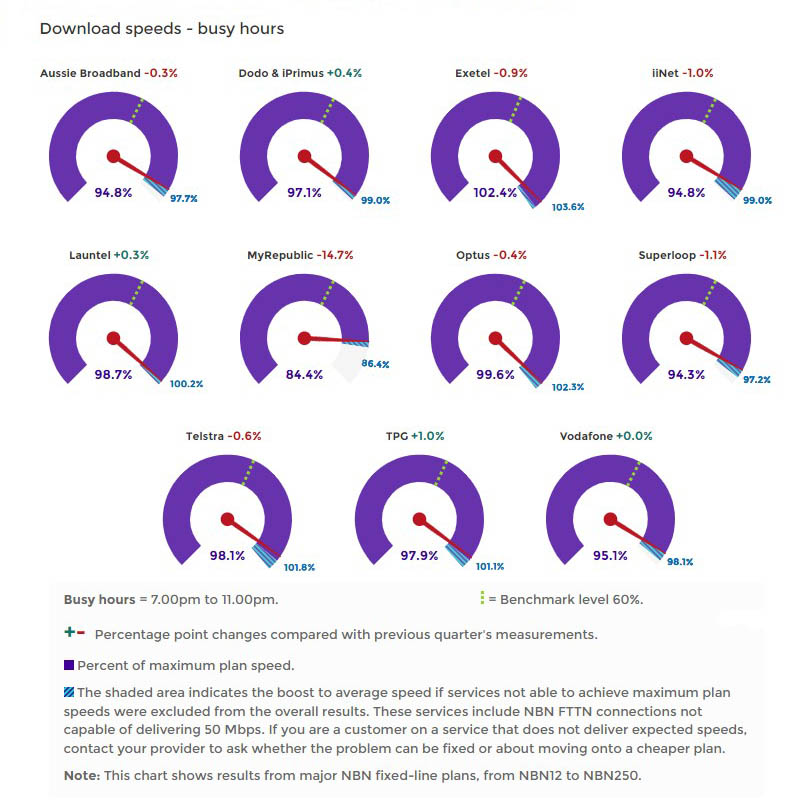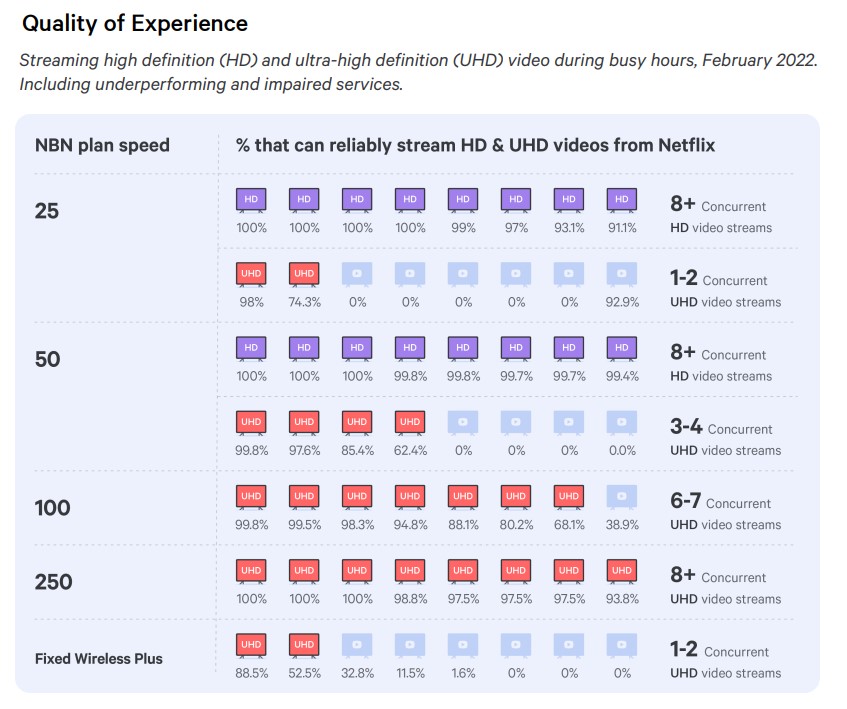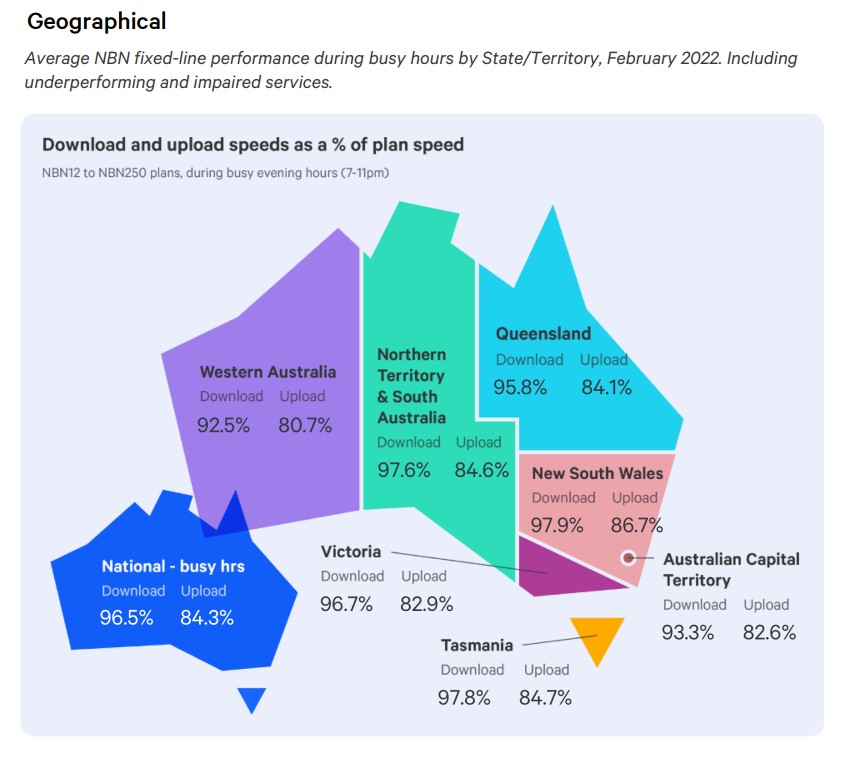The Australian Competition and Consumer Commission (ACCC) has released its latest report on NBN speeds, pitting 12 of Australia’s biggest and best-known providers against one another in a quarterly battle for broadband supremacy. And in good news for smaller telcos, Exetel has continued its winning streak — claiming the fastest download crown for the second consecutive report.
The 17th Measuring Broadband Australia report looks at the average performance of NBN providers during the busy traffic period between 7pm and 11pm. This quarter’s report measured speeds through February 2022, with the average for each provider measured as the percentage of the maximum attainable speed available on each connection and plan. The higher the percentage, the faster a provider’s plans performed on average during the testing period.
Tests were performed on connections from 12 popular NBN providers, including Telstra, Optus, Vodafone, TPG, Dodo and iPrimus, iiNet, Aussie Broadband, Exetel, MyRepublic, Superloop and Launtel. The ACCC also looked at how fixed-line connections perform in both metro and regional parts of Australia, and on a state-by-state basis.
Fastest NBN download speeds
Throughout February, fixed-line connections (that’s NBN connections that use fibre technology, such as Fibre to the Node, Fibre to the Premises, or HFC) achieved an average download speed of 97.9% during all hours, and an average busy-hour speed of 96.5%. This is down slightly when compared to the ACCC’s previous report, which cited an average download speed of 98.4% overall, and 97.4% during peak traffic hours.
Exetel retained its number-one spot, achieving an average download speed of 102.4% of the maximum speed available, and blitzing past Optus’ 99.6% result. NBN Co often over-provisions the download component on plans to safeguard against congestion, so it’s not unusual for providers to score more than 100% in total; in this report, Exetel was the only telco to achieve a better-than-perfect average.
The full download speed results are:
- Exetel: 102.4%
- Optus: 99.6%
- Launtel: 98.7%
- Telstra: 98.1%
- TPG: 97.9%
- Dodo & iPrimus: 97.1%
- Vodafone: 95.1%
- Aussie Broadband: 94.8%
- iiNet: 94.8%
- Superloop: 94.3%
- MyRepublic: 84.4%
Launtel achieved third place with 98.7%, an excellent result considering the provider was only added to the ACCC’s testing in the previous report. Telstra took home fourth place with 98.1%, and fellow big-name brand TPG claimed the number-five spot with 97.9%.
Testing was performed across 1,267 whiteboxes connected to fixed-line NBN, with a massive 238,701 download speed tests recorded. The ACCC noted that while speeds are generally fast, most providers did clock a slower overall average when compared to testing conducted in December 2021.
“Speeds are generally holding up well, however, most retailers experienced a small drop in speed in February during the busy evening hours,” said ACCC Commissioner Anna Brakey.

NBN 1000 speeds
While the above tests reflect average download speeds across NBN 25, NBN 50, NBN 100 and NBN 250 plans, the ACCC also tested the performance of very high speed NBN plans, i.e. NBN 1000. 23,003 download speed tests were performed across these plans in February; of these, 46.9% of tests achieved a download speed of 900Mbps or faster.
The ACCC found that average hourly download speeds ranged between 692Mbps and 825Mbps. During the 7pm to 11pm busy period, average speeds fell 133Mbps below the day’s maximum; this is a much bigger gap in peak vs off-peak speeds than found on other NBN tiers, and shows that NBN 1000 plans remain susceptible to congestion during busy hours.
Compare NBN plans
If you’re looking to see how these telcos stack up on price and features, you can compare unlimited data NBN 50 plans below.
The following table shows a selection of published unlimited Standard Plus Evening Speed (NBN 50) plans from Canstar Blue’s database, listed in order of standard monthly cost, from the lowest to highest and then by data allowance, largest to smallest. Use our NBN comparison tool see plans from a range of other providers. This is a selection of products with links to a referral partner.
Fastest Netflix speeds
The ACCC also tested how reliably each provider could stream multiple high definition (HD) and ultra-high definition (UHD) Netflix streams during the busy evening period. Tests were performed on fixed-line NBN services across the NBN 25, NBN 50, NBN 100 and NBN 250 speed tiers, as well as on Fixed Wireless Plus services, to determine how many concurrent video streams could be supported.
NBN 50 plans could reliably stream up to three simultaneous HD streams in 100% of tests, and one UHD stream in 98.8% of tests. NBN 100 plans were capable of supporting two UHD streams in 99.5% of tests, while 100% of NBN 250 tests were able to stream three concurrent UHD videos.

Fastest speeds by state
This quarter’s report also examined how fixed-line NBN speeds compare between Australian states, and across metro and regional locations. The ACCC found that both urban and regional areas showed an overall improvement in speeds when compared to averages from November 2018. Urban areas now log an average download speed of 98.2% (up from 85.7%), while speeds in regional locations average 95.2% (an increase from 83.7% in 2018).
“Regional fixed-line services have improved over the last four years, but still have some way to go to be on par with urban connections,” said Ms. Brakey.
On a state-by-state basis, New South Wales achieved the fastest average download speeds, with 97.9% of the maximum speed available. This was followed by Tasmania with 97.8%, and Northern Territory/South Australia at 97.6%. The Australian Capital Territory performed worst, with an average download speed of 93.3%.

Fastest upload speeds
Like download speeds, upload speeds declined when compared to the previous quarter, with an average performance of 84.7% during all hours (down from 85.0%). Exetel again placed first, achieving an average busy hour result of 88.4% of the maximum attainable speed, followed by Launtel with 87.5% and Dodo and iPrimus with 86.1%.
The full upload speed results are:
- Exetel: 88.4%
- Launtel: 87.5%
- Dodo & iPrimus: 86.1%
- Optus: 85.4%
- Vodafone: 85.3%
- Superloop: 84.9%
- Telstra: 84.9%
- MyRepublic: 84.1%
- iiNet: 82.9%
- Aussie Broadband: 82.3%
- TPG: 82.0%


Share this article